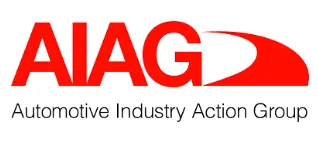AIAG: Automotive Industry Action Group

AIAG, the Automotive Industry Action Group, is a nonprofit organization that develops and publishes standards for manufacturing within the automotive industry. Headquartered near Detroit, United States, AIAG standards are involved in the production of virtually every car in the United States, as well as the international production of American automotive companies. With 750 member companies covering every step of the supply chain, AIAG standards define the industry. Standards from AIAG are available both individually, directly through the ANSI webstore, and as part of a Standards Subscription. If you or your organization are interested in easy, managed, online access to standards that can be shared, a Standards Subscription may be what you need - please contact us at: [email protected] or 1-212-642-4980 or Request Proposal Price.
Below are AIAG's best-selling standards. To find additional standards, please use the search bar above.
AIAG MSA-4:2010
Measurement Systems Analysis (MSA), Reference Manual Fourth Edition (Secured file - cannot be printed)
This manual presents guidelines for assessing the quality of a measurement system. Its primary focus is systems where readings can be replicated on each part.. 4th Edition - 6/2010
AIAG CQI-9:2020
Special Process: Heat Treat System Assessment (Secured file - cannot be printed)
The goal of the publication is the development of a heat treat management system that provides for continual improvement, emphasizing defect prevention and the reduction of variation and waste in the supply chain.
This manual includes a CD which contains the heat treat system assessment worksheets.
AIAG PPAP-4:2006
PPAP-4: Production Part Approval Process (PPAP) 4th edition (Secured file - cannot be printed)
Production Part Approval Process (PPAP) defines requirements for production part approval, including production and bulk materials. The purpose of PPAP is to determine if all customer engineering design record and specification requirements are properly understood by the supplier and that the process has the potential to produce product consistently meeting these requirements during an actual production run at the quoted production rate. Version 4 - 3/2006
AIAG CQI-15:2020
Special Process: Welding System Assessment (Secured file - cannot be printed)
The goal of the publication is the development of a weld management system that provides for continual improvement, emphasizing defect prevention and the reduction of variation and waste in the supply chain. This manual includes an excel file which contains the welding system assessment worksheets.
AIAG CQI-20:2018
Effective Problem Solving Guideline (Secured file - cannot be printed)
Preventing recurring problems and implementing corrective actions quickly and effectively is one of the main concerns in manufacturing today. This guide provides the latest thinking in problems solving available and focuses on root cause analysis and the roles of the problem solving team members in resolving difficult to diagnose issues. It also provides guidance for which quality tools are most effective at each stage of the process, ensuring you're using the right tool at the right time. This guide, when used with AIAG Effective Problem Solving Leader Guide CQI-21, provides valuable tools in helping your organization realize an increase in quality and profits.
AIAG SPC-3:2005
SPC-3: Statistical Process Control - SPC Second Edition (Secured file - cannot be printed)
SPC-3 This manual is an introduction to statistical process control and is intended to cover normally occurring SPC system situations. It is not intended to limit evolution of SPC methods suited to particular processes or commodities. AIAG members receive member price after logging in. Version 2 - 07/2005
AIAG APQP:2008
APQP: Advanced Product Quality and Control Plan (Secured file - cannot be printed)
The APQP manual provides general guidelines for ensuring the Advanced Product Quality Planning is implemented in accordance with the requirements of the customer. It does not give specific instructions on how to arrive at each APQP or Control Plan entry. These guidelines are intended to cover most situations that can normally occur in the early planning or design phases, or during process analysis. Questions about these guidelines should be directed to your authorized customer representative. Second Edition - 07/2008.
AIAG CQI-12:2020
Special Process: Coating System Assessment (Secured file - cannot be printed)
The goal of the publication is the development of a coating management system that provides for continual improvement, emphasizing defect prevention and the reduction of variation and waste in the supply chain. This manual includes a CD which contains the coating system assessment worksheets.
AIAG CQI-18:2011
CQI-18: Effective Error-Proofing
The goal of the AIAG Effective Error-Proofing guideline is to provide the reader with a comprehensive manual to achieve a "zero error" culture. The guide will focus the reader's understanding and efforts related to building a "zero error" culture within their companies.
AIAG FMEA-4:2008
FMEA-4: Potential Failure Effects Analysis (Secured file - cannot be printed)
The FMEA is a reference manual to be used by suppliers to Chrysler LLC, Ford Motor Company, and General Motors Corporation as a guide to assist them in the development of both Design and Process FMEAs. The manual does not define requirements; it is intended to clarify questions concerning the technical development of FMEAs. Fourth Edition - 06/2008.
